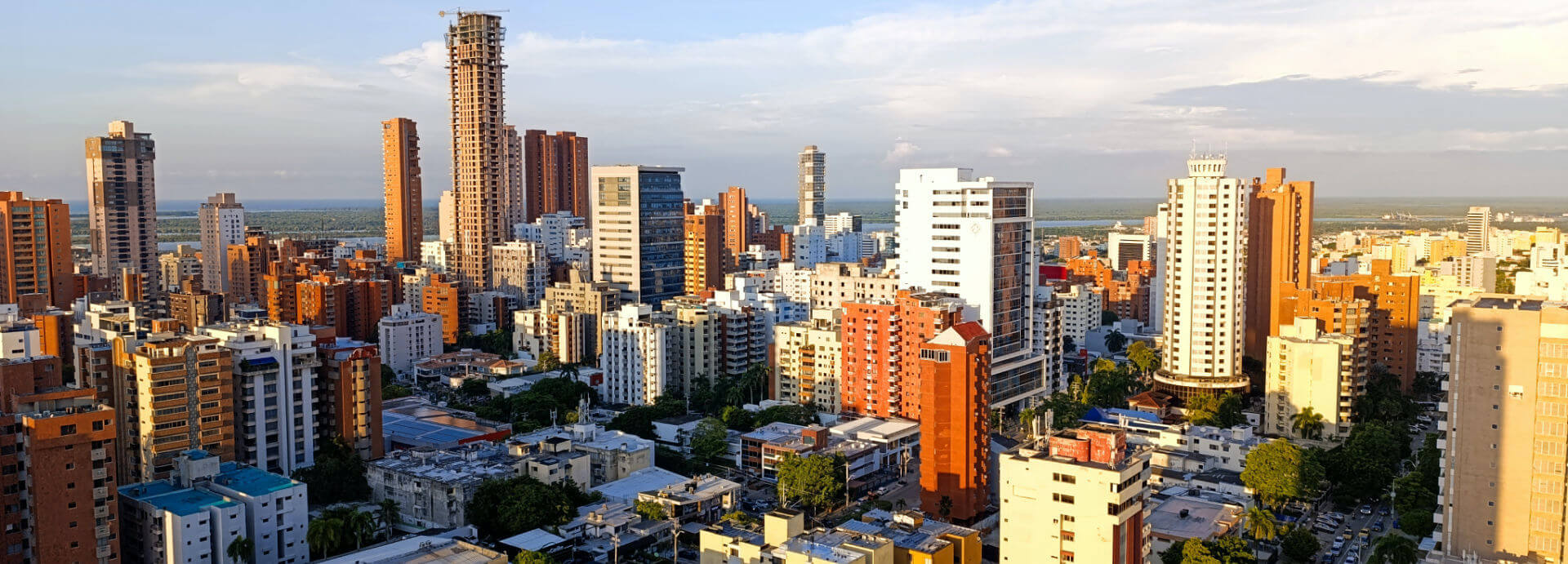
Welcome to Barranquilla, the vibrant heart of Colombia’s Caribbean coast! Shakira’s hometown is the insider’s pick for travelers seeking an authentic taste of Caribbean lifestyle. Where the mighty Magdalena River meets the sea, Barranquilla pulsates with culture, history, natural beauty, and mouthwatering cuisine!
This dynamic city is reclaiming fascinating nature spots through innovative environmental restoration projects – for both locals and visitors to enjoy. These new attractions perfectly complement Barranquilla’s classic charms, including its incredible music scene and unique Carnival. (I travel quite frequently to Barranquilla, and each time I fall more in love with the city…)
Uncover the best of Barranquilla with this insider’s guide to the top things to do in 2026!
The historical districts El Prado and Alto Prado, located next to each other, are great for strolling along wide streets under the shadow of trees while admiring beautiful colonial and republican buildings and mansions. For example, you can start at Parque Santander and then walk along carrera 58 towards the carnival museum, crossing the abundant Parque Los Fundadores. For those interested in history and architecture, there’s a very affordable tour available at Civitatis.com*.
For a coffee break, check out extravagant and pink-themed Loe Cafe, which serves delicious coffee and cake (see Google Maps).
Tip: If you love coffee, also don’t miss Época Café Bar in nearby Riomar (see Google Maps)! This women-owned cafe offers unique flavors from selected Colombian coffee farms and unique breakfasts. Enjoy your cup on the pleasant outdoor terrace!
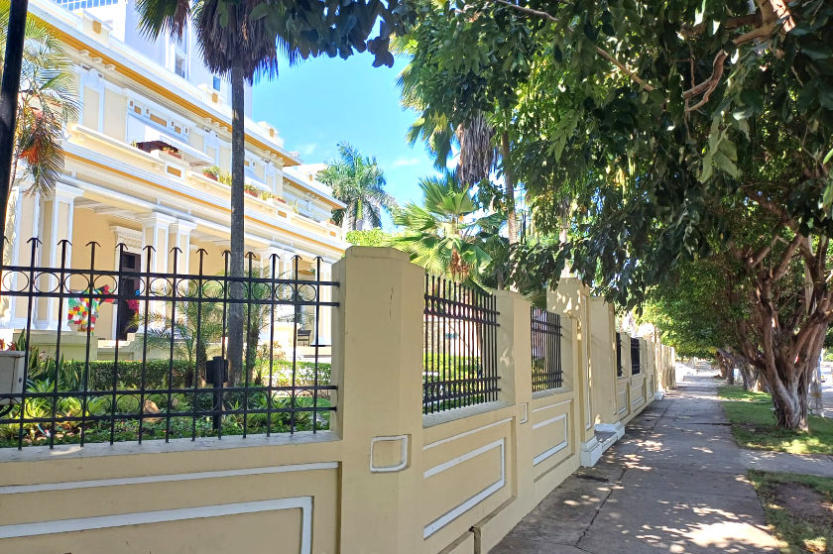
Photo by Nicole (Travelhapp), El Prado Neighborhood Barranquilla
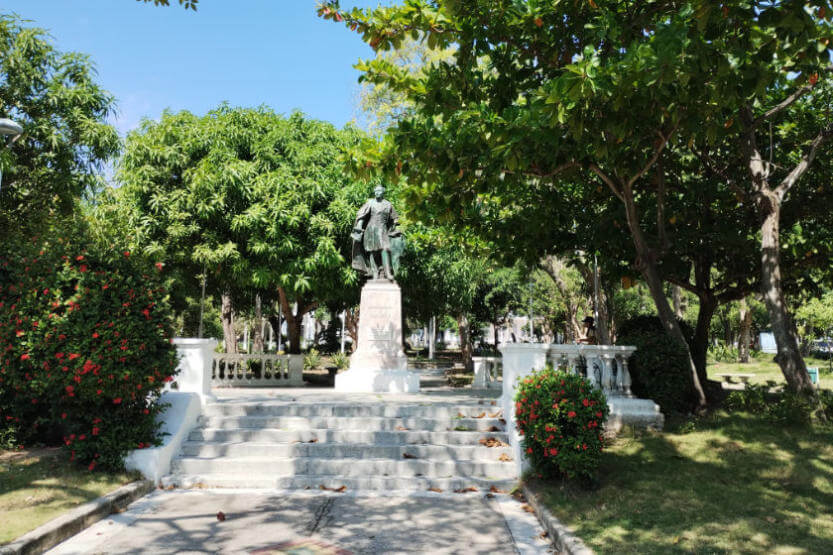
Photo by Nicole (Travelhapp), Parque Los Fundadores Barranquilla
The Carnaval de Barranquilla is one of the most famous and colorful carnivals in the world. The Carnival Museum documents the history of the carnival, and its exhibits include impressive costumes, masks, and other artifacts.
Of course, visiting the actual carnival (usually around February/March) leads the top things to do in Barranquilla for carnival lovers. In Barranquilla, “pre-carnival” events start around two weeks before the official carnival, and you can feel the carnival vibe in the city as early as the beginning of January.
A great place to immerse yourself in Barranquilla’s Afro-Colombian culture and enjoy live music and traditional Afro-Colombian dances during the carnival is Barrio Abajo.
On Civitatis.com* you can find interesting Carnival-related tours!
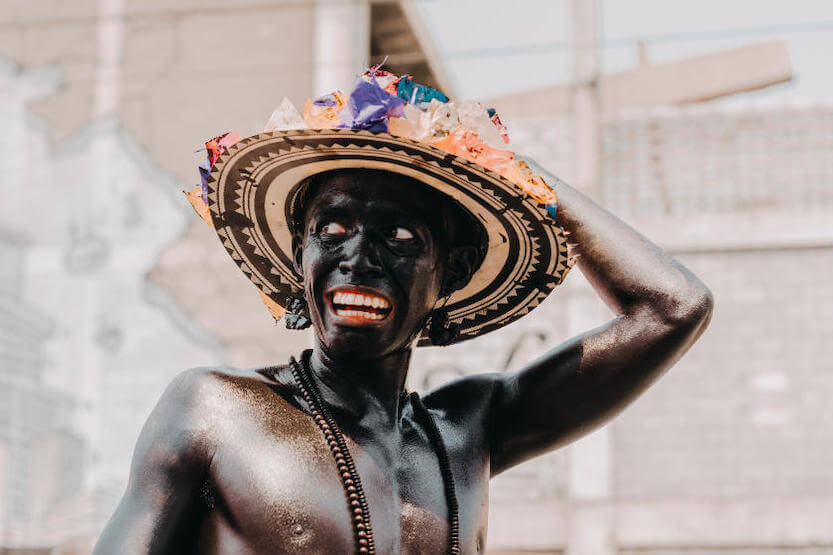
Photo by larry penaloza, Carnival in Barranquilla
Enjoy a leisurely stroll along the majestic Magdalena River on Barranquilla’s recently extended Malecón (Gran Malecón del Río), a scenic promenade stretching for miles and adorned with restaurants, cafes, and bars.
On your way, you will pass by green parks, the Shakira statue, and refreshing fountains. At the southern end of the Malecón, you can admire the “Aleta del Tiburón”, a colorful modern monument representing a shark fin, a reference and homage to the local soccer club Junior de Barranquilla and its mascot.
Strolling along the Malecón is great in the late afternoon, when temperatures have cooled down a little and the “Aleta del Tiburón” is illuminated in different colors. There are people around and bars open until late, just remember to book a transport service via an app to go back to the central areas of Barranquilla at night (see safety tips below).
Since the Malecón is over 5.5 km long, you may also consider renting one of the scooters available close to Caimán del Río or rent a bike (GetyourGuide.com*). Bike tours often include the center and parts of the Malecón. Barranquilla bike tours with great ratings can be booked online at Viator.com*, Civitatis.com*and GetYourGuide.com*.
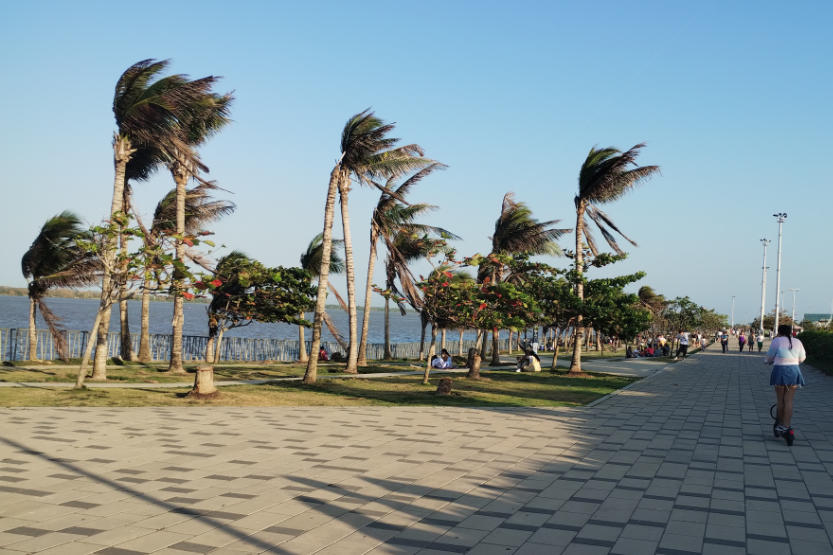
Photo by Nicole (Travelhapp), Barranquilla Malecón
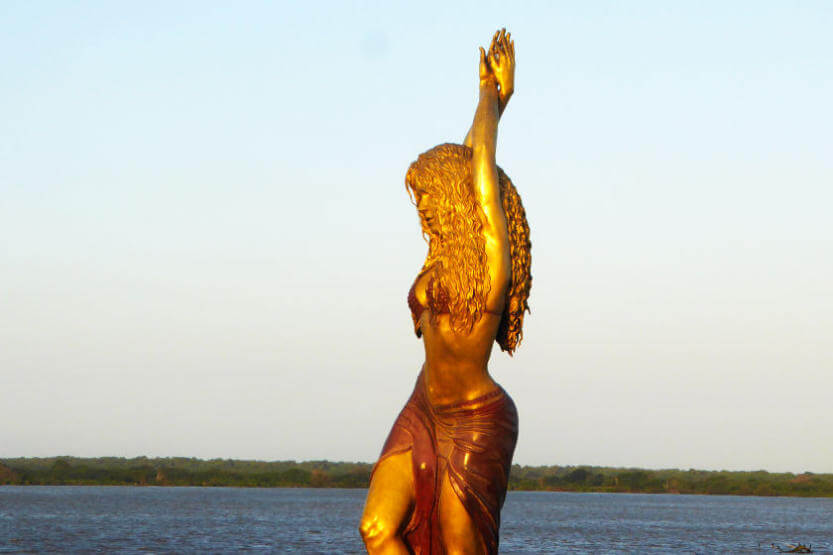
Photo by Nicole (Travelhapp), Shakira Statue, Barranquilla Malecón
Take a boat tour along the Magdalena River or try the new Ríobus “Karakalí”, an innovative river transport system connecting several river towns. The routes will gradually be extended.

Photo by Nicole (Travelhapp), Barranquilla Riverbus (Ríobus Karakalí)
North of the Malecón of Barranquilla, you will find a fascinating wetland area: the Ciénaga de Mallorquín. A beautiful eco-park has been built as part of a significant environmental restoration and conservation effort. Doors are already open to visitors, offering a chance to enjoy a relaxing afternoon walk along the lengthy wooden pier.
The Eco Park also invites visitors to engage in ecotourism activities such as kayaking, bird watching, biking, and more. The Eco Park is very feasible alone, but if you prefer guided tours, you can find great options on GetyourGuide* (in English and Spanish) and Civitatis* (in Spanish).
View pictures of the Cienaga de Mallorquín Eco Park in my Instagram feed.
On the way to the Ciénaga de Mallorquín, you’ll see the Ventana al Mundo (Window to the World), an iconic modern monument designed by the architect Diana Escorcia Borelly for the Central American and Caribbean Games.

Photo by Nicole (Travelhapp), Eco Park Ciénaga de Mallorquín, Barranquilla
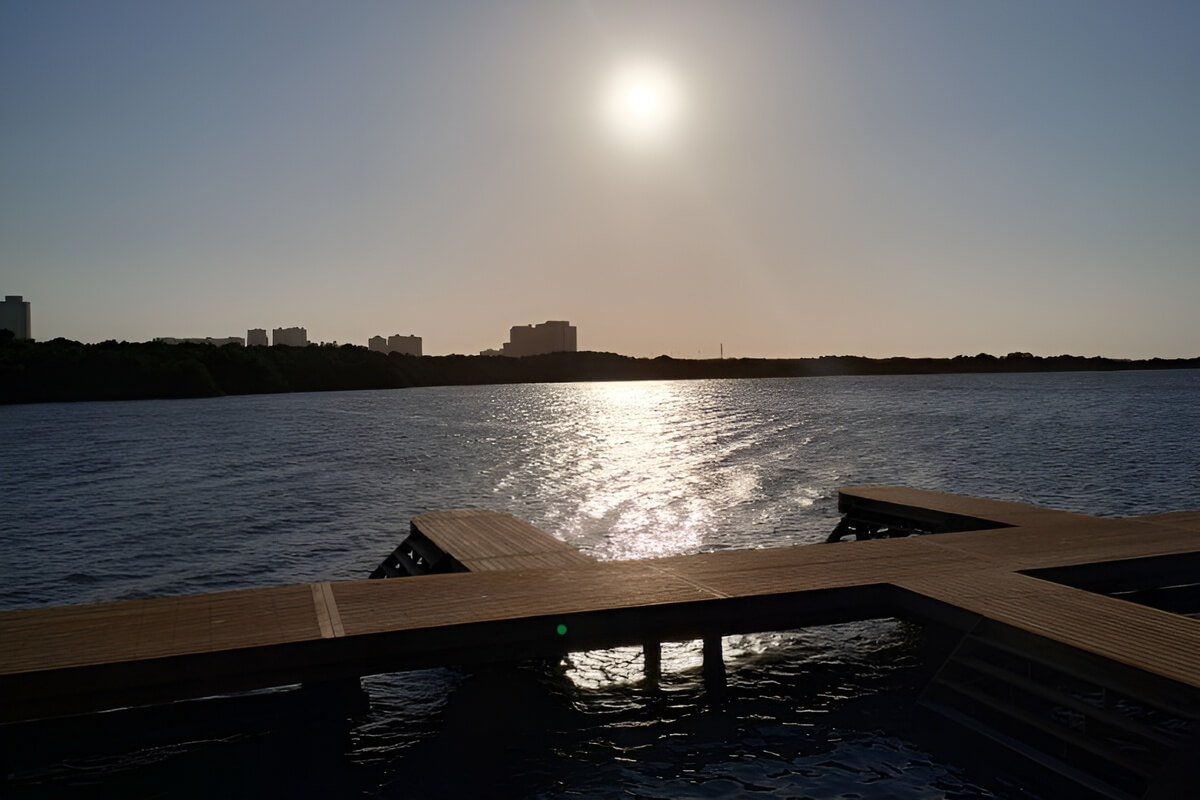
Photo by Nicole (Travelhapp), Sunset in Eco Park Ciénaga de Mallorquín, Barranquilla
The historical center of Barranquilla (centro) used to be quite decadent, and you will still find many street corners that are not exactly pleasant. However, the city is making efforts to revitalize it and make it more enjoyable to explore for both citizens and visitors.
Stroll along the renowned Paseo de Bolívar until you reach the Iglesia de San Nicolás de Tolentino. This baroque church was built in the 17th century by the Augustinian order. It’s a great place to cool down while admiring the beautiful stained glass windows and enjoying the silence.
From San Nicolás de Tolentino church, walk down Calle 32 to reach “Callejón del Meao” or take Carrera 42 to reach “Callejón de Robertico.” (Both alleys are located in the area between Carrera 42B and 42C and Calle 30 to 33.)
The Aduana building at Plaza de la Aduana is very beautiful, but the area around is a bit sketchy. You may consider taking a taxi/Uber for a quick photo stop (like I did).
I recommend visiting the center in the morning or afternoon and staying in populated, touristy areas, avoiding streets that are either too busy or too empty. Or join the interesting and affordable literature tour available con Civitatis.com* to explore the center in a group and learn about Barranquilla’s influence on Gabriel García Marquez and other writers.

Photo by Nicole (Travelhapp), San Nicolás de Tolentino church in Barranquilla
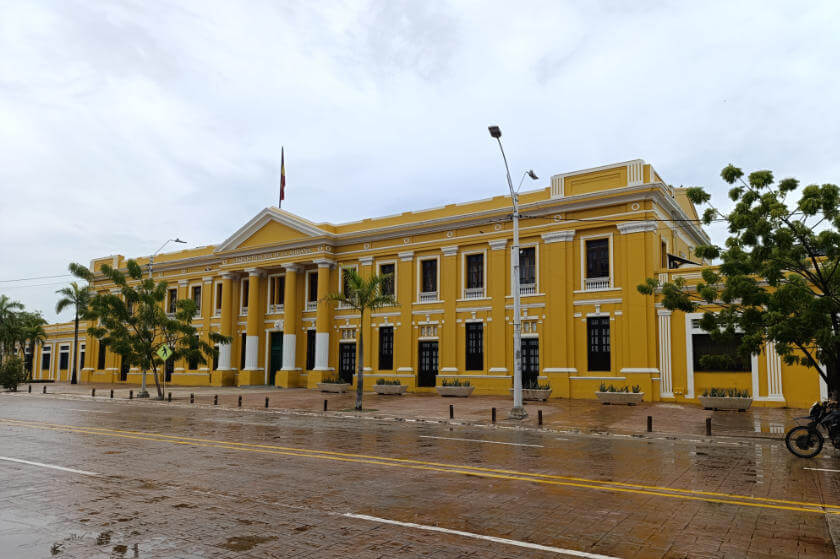
Photo by Nicole (Travelhapp), Aduana building, Barranquilla
Barranquilla has a vibrant street art scene and you can view impressive graffiti and murals in many neighborhoods, including El Centro, La Loma, El Prado and Barrio Abajo.
By the way, there is a great Barranquilla free tour (Civitatis.com)* available, which starts in Barrio Abajo.
Barranquilla is the city of music and dance and attending a live concert ranks among the top things to do in Barranquilla. Interesting addresses include La Casa de la Cumbia in the El Prado neighborhood which hosts live music covering many different Colombian genres (Cumbia, Vallenato, Salsa, etc.). Check out @killacultural on Instagram for upcoming events (in Spanish).
Remember that in Colombia, it is always advisable to take a pre-booked transport when you go out at night. It’s both cheap and safe, and it’s the standard way Colombians move around at night. It’s also advisable to go out in a group at night, rather than alone.
If you love to dance salsa or want to learn, Barranquilla has no shortage of options. The salsa club La Troja in the Riomar neighborhood was founded in 1983 and has been a local favorite ever since. The club hosts live concerts of talented local and national musicians every night and attracts a diverse crowd of Barranquilleros and foreigners. Other salsa clubs, which are popular among locals, include Tibiri (barrio El Prado), Son de Negro (barrio El Golf) and Rumba en el Solar (an outdoor venue in barrio El Bosque).

Photo by Hector Pertuz, Street dancing in Barranquilla (mod.)
Barranquilla is known as a culinary heaven with a wide array of great restaurants in all price classes. Enjoy traditional Caribbean food by the river at Cucayo in the Caimán del Río restaurant complex (see Google Maps). Typical caribbean dishes include seafood in different variants accompanied by coconut rice and plantains. Yummy!
For an upscale fusion experience try Kinto Elemento (Google Maps) or Palo de Mango (Google Maps) in El Prado. You can find several other fine restaurants very close-by.
The Jardín Botánico Armando Dugand Gnecco is a peaceful oasis within the city of Barranquilla where you can connect with nature and enjoy native and exotic vegetation.
The Mapuka Museum (Google Maps) is the Archaeological Museum of the Karib Peoples. It offers a fascinating journey through 20,000 years of Caribbean history, presenting exhibits on first civilizations, pre-Hispanic cultures, and colonial impact. The museum also hosts art workshops, including drawing and pottery. Check their Instagram feed for current events.
Unfortunately, some of Barranquilla’s other interesting museums are temporarily closed, including the Museo del Caribe (Caribbean Museum), the Museum of Modern Art, and the Museo Romántico (Romantic Museum). Currently, we have no information when they will reopen but restoration projects have already started for some of them. Please check recent user reviews on Google Maps to see if there are any changes.
Photogenic Puente Pumarejo is an architectural marvel spanning the wide Magdalena River, and offering stunning views. Watch out for your belongings near the bridge, though.

In December 2024, Barranquilla’s first beach, Puerto Mocho, was inaugurated! It’s accessible via the new Tren Bocas de Ceniza train, which departs from the Las Flores Station (Google Maps) in Riomar.
This project marks a significant step toward the ecological restoration of the coast, with more beach sections to follow in the future. The new train route is complemented by attractive cycling and pedestrian paths.
About 6 km away is Bocas de Ceniza, where the Magdalena River meets the sea, reachable via moto taxi from Puerto Mocho. There are also guided tours to Bocas de Ceniza (Civitatis.com*).

Photo by Nicole (Travelhapp) View of Bocas de Ceniza from Puerto Mocho

Photo by Nicole (Travelhapp), Playa Puerto Mocho Barranquilla
Barranquilla is the perfect base for exploring hidden gems of Colombia’s Caribbean region. Just a stone’s throw away, you’ll find charming coastal towns, lesser-known beaches, and stunning natural attractions ideal for day trips. Discover 5 great day trips from Barranquilla!
You can find exciting day tours, for example, on GetYourGuide.com*, Viator.com*, and Civitatis.com*.
El Prado, Alto Prado, El Golf and Riomar are great neighborhoods to stay for solo (female) travelers. The center (Centro – around Plaza San Nicolás and Paseo Bolívar) is not considered particularly safe by locals, especially at night.
Prices typically vary depending on season, and – of course – room type. Expect notably higher prices during carnival. Many mid-range and upscale hotels in Barranquilla feature swimming pools.
You can find great hotel deals in Barranquilla on Booking.com*. Here are my top picks.
Starting around 100 USD per night, you can find excellent upscale and luxury hotels in Barranquilla.
Great mid-range options start around 35 USD per night.
In Barranquilla you can find nice private rooms with bathroom starting somewhere around 20 USD/night. Dorms are cheaper.
If you plan to go out at night, it is, like everywhere in Colombia, advisable to book transport via an app like Uber, Didi, or InDrive, even for short distances. This is very cheap in Colombia, and locals do the same. You should not walk alone at night or around remote areas.
Check out my safety tips for Colombia and intro guide for traveling alone in Colombia.
Hikes in nature are better done in a group and/or with a local guide. On Facebook you’ll find dedicated groups for Colombia travelers.
Barranquilla features a tropical savanna climate with high humidity. Temperatures in Barranquilla typically range from around 28°C to 33°C (82-91°F) during the day and fluctuate around 24°C (75°F) at night; the “coldest” months in Barranquilla are January and February with a maximum temperature of approximately 31°C (88°F). The driest months are January to March while the most rain tends to fall in October. The dry months usually also feature a nice breeze which makes them a very enjoyable time to visit.
For carnival aficionados, the carnival season is undoubtedly the best time to visit Barranquilla. However, if you’re a solo traveler who isn’t particularly fond of crowds, you might consider visiting during the pre-carnival period. During this time, you can enjoy pleasant weather and get a taste of the carnival culture without the large crowds. Pre-carnival starts right on new year’s day!
Barranquilla is strategically located between Santa Marta and Cartagena, two of Colombia’s top travel destinations. So, you may stop over in Barranquilla when traveling between those cities.
I warmly recommend a detour to the amazing colonial river town Mompox (Santa Cruz de Mompós) when traveling between Barranquilla and Cartagena.
Check out the bus connections on Rome2Rio:
Bus from Barranquilla to Cartagena on Rome2Rio (2,5 hours)
Bus from Barranquilla to Mompox on Rome2Rio (6-8 hours)
Bus from Barranquilla to Santa Marta on Rome2Rio (2 hours)
Share:
Last Update: February 7, 2026
*Affiliate links: Some of the links on this page are affiliate links (marked with *). If you choose to book through them, you support my work on Travelhapp – at no extra cost to you. I only recommend products and services I trust and believe will bring value to you.
© 2026 Travelhapp.com
To provide the best experiences, we use technologies like cookies to store and/or access device information. Consenting to these technologies will allow us to process data such as browsing behavior or unique IDs on this site. Not consenting or withdrawing consent, may adversely affect certain features and functions. View our Privacy & Cookie Policy